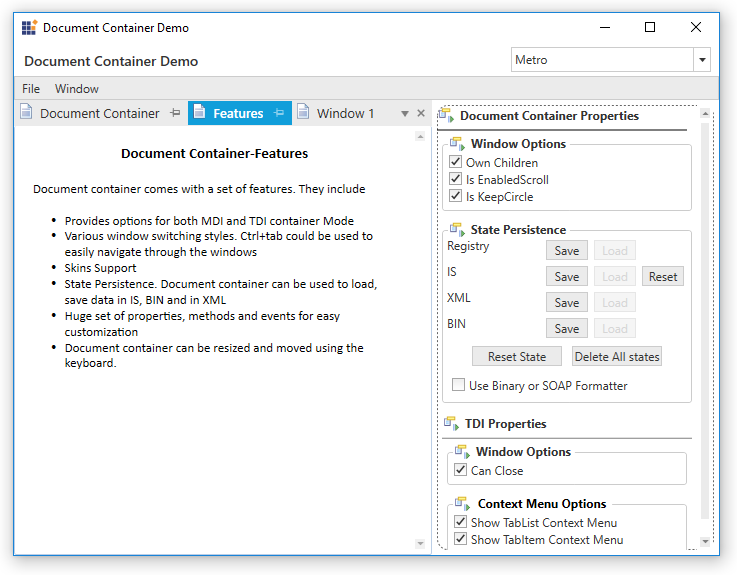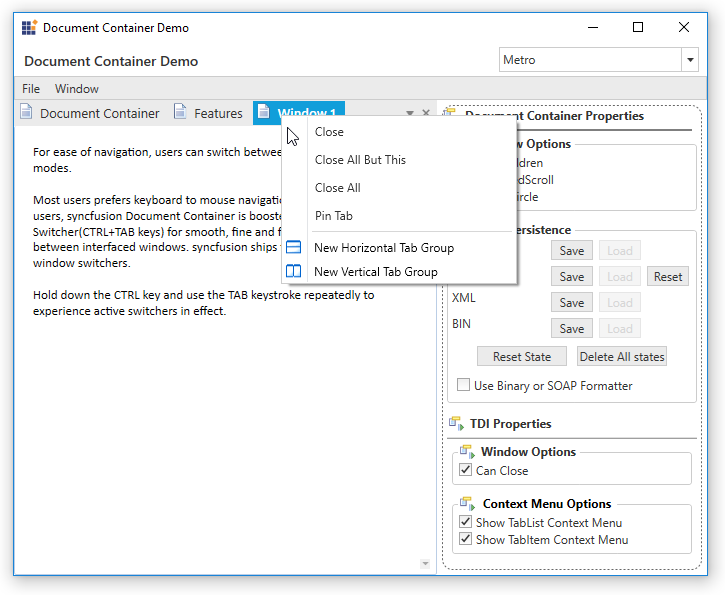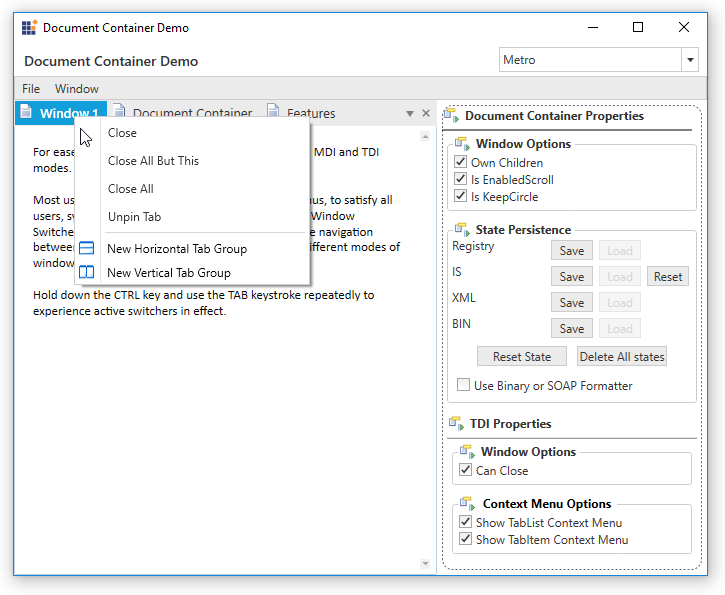How can I help you?
Pin and Unpin TabItems in WPF Tabbed MDI Form (DocumentContainer)
18 Feb 202524 minutes to read
This section explains the pin and unpin tab items support in DocumentContainer.
Enabling/disabling pinning behavior
The AllowPin attached property of DocumentContainer decides whether the tab item can be pinnable or not. The corresponding tab item will be pinned only if the property AllowPin is true. When the property is false, pin and unpin behavior of tab item will be disabled. The default value of the AllowPin property is false.
<syncfusion:DocumentContainer
Name="DocContainer"
Mode="TDI">
<syncfusion:DocumentContainer.Icon>
<ImageBrush ImageSource="document.png"/>
</syncfusion:DocumentContainer.Icon>
<!--TDI/MDI Children elements of the Document Container-->
<FlowDocumentScrollViewer
syncfusion:DocumentContainer.AllowPin="True"
syncfusion:DocumentContainer.Header="Document Container">
<FlowDocument FontFamily="Calibri" FontSize="13" TextAlignment="Left">
<Paragraph FontWeight="Bold" FontSize="15" TextAlignment="Center">
Syncfusion WPF Document Container</Paragraph>
<Paragraph>This sample exhibits the special features
of the Syncfusion Document Container Control for
Windows Presentation Foundation(WPF).
</Paragraph>
<Paragraph>View this document to experience the features of the
Document Container.Document Container supports both TDI and MDI.
</Paragraph>
<Paragraph>On certain occasions, users may need the data to be contained in
the traditional MDI(Multiple Document Interface) and others where constant
comparison needs to be made between the documents requires a
TDI(Tabbed Document Interface).</Paragraph>
</FlowDocument>
</FlowDocumentScrollViewer>
<FlowDocumentScrollViewer
syncfusion:DocumentContainer.AllowPin="True"
syncfusion:DocumentContainer.Header="Features" >
<FlowDocument FontFamily="Calibri" FontSize="13" TextAlignment="Left" >
<Paragraph FontWeight="Bold" FontSize="15" TextAlignment="Center">Document
Container-Features</Paragraph>
<Paragraph>Document container comes with a set of features. They include
</Paragraph>
<List>
<ListItem>
<Paragraph>Provides options for both MDI and TDI container Mode
</Paragraph>
</ListItem>
<ListItem>
<Paragraph>Various window switching styles. Ctrl+tab could be used
to easily navigate through the windows</Paragraph>
</ListItem>
<ListItem>
<Paragraph>Skins Support</Paragraph>
</ListItem>
<ListItem>
<Paragraph>State Persistence. Document container can be used to
load, save data in IS, BIN and in XML</Paragraph>
</ListItem>
<ListItem>
<Paragraph>Huge set of properties, methods and events for easy
customization</Paragraph>
</ListItem>
<ListItem>
<Paragraph>Document container can be resized and moved using the keyboard.
</Paragraph>
</ListItem>
</List>
</FlowDocument>
</FlowDocumentScrollViewer >
<FlowDocumentScrollViewer
syncfusion:DocumentContainer.AllowPin="True"
syncfusion:DocumentContainer.Header="Window 1" >
<FlowDocument FontFamily="Calibri" FontSize="13" TextAlignment="Left">
<Paragraph>For ease of navigation, users can switch between the MDI and TDI modes.
</Paragraph>
<Paragraph>Most users prefers keyboard to mouse navigation. Thus, to
satisfy all users, syncfusion Document Container is boosted by
Window Switcher(CTRL+TAB keys) for smooth, fine and flexible navigation
between interfaced windows. syncfusion ships five different modes of window
switchers.
</Paragraph>
<Paragraph>
Hold down the CTRL key and use the TAB keystroke repeatedly to
experience active switchers in effect.
</Paragraph>
</FlowDocument>
</FlowDocumentScrollViewer>
</syncfusion:DocumentContainer>Pin and Unpin tab items using PinButton
The PinButton will be visible in the tab items only when the property ShowPin is true. The default value of the property is false, so the pin button will be collapsed in the tab item.
<syncfusion:DocumentContainer
Name="DocContainer"
Mode="TDI">
<syncfusion:DocumentContainer.Icon>
<ImageBrush ImageSource="document.png"/>
</syncfusion:DocumentContainer.Icon>
<!--TDI/MDI Children elements of the Document Container-->
<FlowDocumentScrollViewer
syncfusion:DocumentContainer.AllowPin="True" syncfusion:DocumentContainer.ShowPin="True"
syncfusion:DocumentContainer.Header="Document Container">
<FlowDocument FontFamily="Calibri" FontSize="13" TextAlignment="Left">
<Paragraph FontWeight="Bold" FontSize="15" TextAlignment="Center">
Syncfusion WPF Document Container</Paragraph>
<Paragraph>This sample exhibits the special features
of the Syncfusion Document Container Control for
Windows Presentation Foundation(WPF).
</Paragraph>
<Paragraph>View this document to experience the features of the
Document Container.Document Container supports both TDI and MDI.
</Paragraph>
<Paragraph>On certain occasions, users may need the data to be contained in
the traditional MDI(Multiple Document Interface) and others where constant
comparison needs to be made between the documents requires a
TDI(Tabbed Document Interface).</Paragraph>
</FlowDocument>
</FlowDocumentScrollViewer>
<FlowDocumentScrollViewer
syncfusion:DocumentContainer.AllowPin="False" syncfusion:DocumentContainer.ShowPin="True"
syncfusion:DocumentContainer.Header="Features" >
<FlowDocument FontFamily="Calibri" FontSize="13" TextAlignment="Left" >
<Paragraph FontWeight="Bold" FontSize="15" TextAlignment="Center">Document
Container-Features</Paragraph>
<Paragraph>Document container comes with a set of features. They include
</Paragraph>
<List>
<ListItem>
<Paragraph>Provides options for both MDI and TDI container Mode
</Paragraph>
</ListItem>
<ListItem>
<Paragraph>Various window switching styles. Ctrl+tab could be used
to easily navigate through the windows</Paragraph>
</ListItem>
<ListItem>
<Paragraph>Skins Support</Paragraph>
</ListItem>
<ListItem>
<Paragraph>State Persistence. Document container can be used to
load, save data in IS, BIN and in XML</Paragraph>
</ListItem>
<ListItem>
<Paragraph>Huge set of properties, methods and events for easy
customization</Paragraph>
</ListItem>
<ListItem>
<Paragraph>Document container can be resized and moved using the keyboard.
</Paragraph>
</ListItem>
</List>
</FlowDocument>
</FlowDocumentScrollViewer >
<FlowDocumentScrollViewer
syncfusion:DocumentContainer.AllowPin="True"
syncfusion:DocumentContainer.Header="Window 1" >
<FlowDocument FontFamily="Calibri" FontSize="13" TextAlignment="Left">
<Paragraph>For ease of navigation, users can switch between the MDI and TDI modes.
</Paragraph>
<Paragraph>Most users prefers keyboard to mouse navigation. Thus, to
satisfy all users, syncfusion Document Container is boosted by
Window Switcher(CTRL+TAB keys) for smooth, fine and flexible navigation
between interfaced windows. syncfusion ships five different modes of window
switchers.
</Paragraph>
<Paragraph>
Hold down the CTRL key and use the TAB keystroke repeatedly to
experience active switchers in effect.
</Paragraph>
</FlowDocument>
</FlowDocumentScrollViewer>
</syncfusion:DocumentContainer>
If the property AllowPin is true, the pin button will be enabled and visible. If the property ShowPin is true and AllowPin is false, the pin button will be displayed as disabled button.
Functionality of PinButton
When the pin button of the tab item is visible, the corresponding tab item can be pinned or unpinned from the Tabcontrol. When the corresponding tab item is pinned, it will be inserted at first position of the tab items collection(if the pinned tab item collection has zero count. Otherwise, the pinned tab item will be added to the existing collection). When the tab item is unpinned, it will be removed from the pinned tab item collection and added to the first position of the unpinned tab item collection.
Pin and Unpin the tab items programmatically
Tab items can be pinned or unpinned from the DocumentContainer using IsPinned attached property of DocumentContainer. If the property IsPinned is set to true, the corresponding item will be added to respective index. Also,if the property IsPinned is set as false, the tab item will be removed from pinned collection and added to unpinned tab item collection. The default value of the property is False.
Pin and Unpin tab items through ContextMenu
The pin or unpin operations can be done through tab item’s ContextMenu also. If the property AllowPin is true, and the tab item is not pinned, the “Pin Tab” option will be visible. If the tab item is pinned already, “Unpin Tab” will be visible.
The following images illustrates the same,

